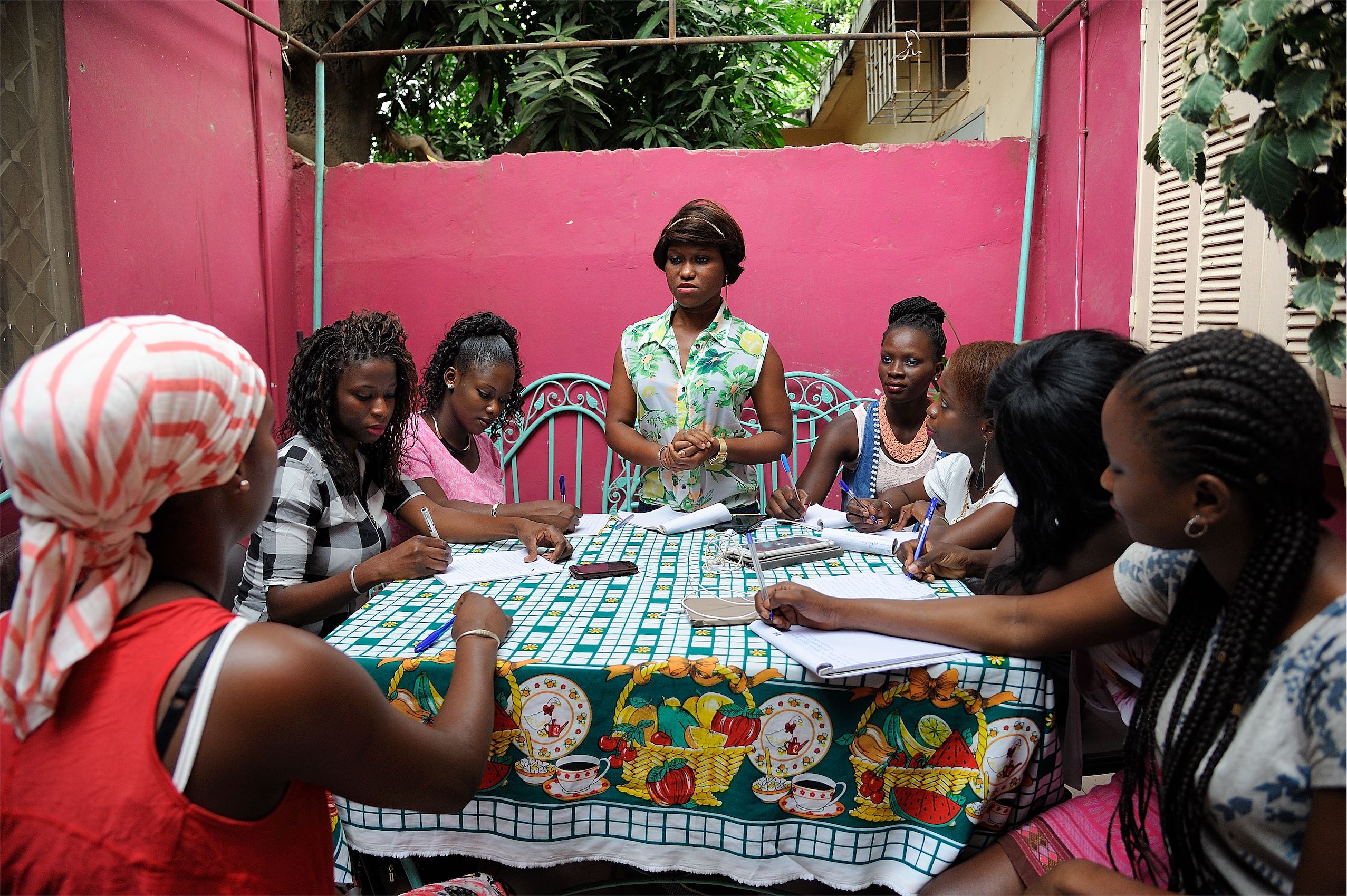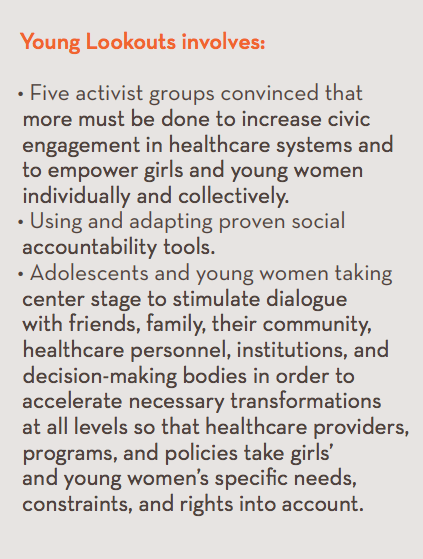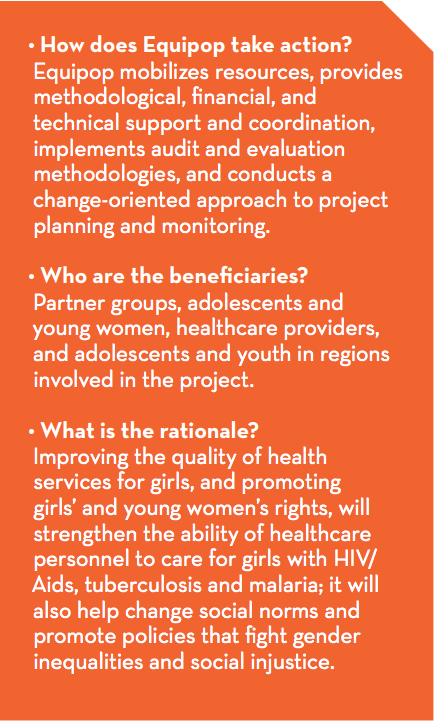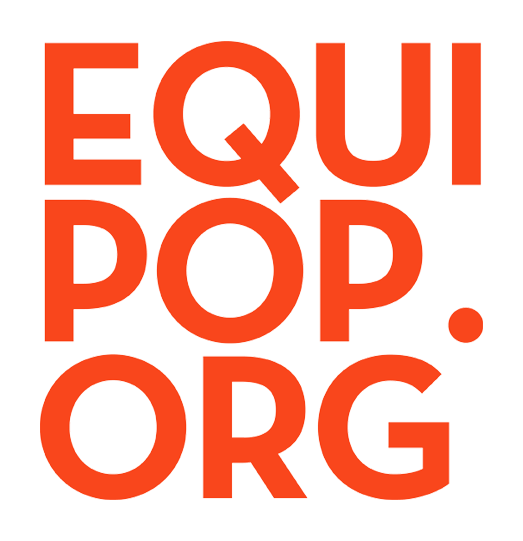
– Young Lookouts : Transform healthcare systems so girls are no longer left behind
In 2019, Equipop continued to support youth and women’s civic participation through the Jeunes en Vigie (Young Lookouts) Project, with funding from the 5% Initiative.1 The project aims to carefully mainstream sexual and reproductive rights into healthcare provision in order to better meet girls’ specific needs, particularly when treating three pandemics: HIV/Aids, tuberculosis, and malaria.
Because of their age and gender, girls and young women grapple with highly unequal power relations that impact their health by, for example, limiting their access to food or exposing them to danger. At the same time, healthcare systems, programs, and policies often fail to meet young women’s and girls’ specific needs. A lack of investment for this “left behind” population, discriminatory attitudes among care providers and the community, disbelief and disregard – such barriers greatly reduce opportunities for girls and young women to access essential information, sound advice, and appropriate medical or psychosocial care.
THE HEALTH OF GIRLS AND YOUNG WOMEN: A PUBLIC HEALTH CHALLENGE AND A HUMAN RIGHTS ISSUE
In Burkina Faso and Senegal, for example, there is reason to be concerned about girls, especially with regard to their sexual and reproductive health and rights. Indicators show that among young people, girls account for 75% of new HIV infections, which increase their risk of contracting tuberculosis. They are also at greater risk of contracting malaria, a risk that increases during pregnancy. Unfortunately, many young Burkinabe and Senegalese women have early pregnancies and consequently see high levels of motherto-child HIV transmission and maternal, neonatal, and infant morbidity and mortality. By the age of 19, 57% of Burkinabe and 34% of Senegalese young women are pregnant or have already had a child.

Everyone agrees that girls and young women need to be more fully taken into account in order to tackle three ongoing pandemics: HIV/Aids, tuberculosis, and malaria. All agree that doing so would leverage the resilience of healthcare systems. However, this consensus struggles to translate into practice. For this reason, Equipop’s Jeunes en Vigie (Young Lookouts) Project, conducted in partnership with Burcaso and SOS/JD in Burkina Faso, and JED and RAES in Senegal, takes an approach that places girls and young women at the heart of its action and strengthens their access to integrated, quality health services Sparking change that are tailored to their specific needs and that respect their rights. The project, based on existing guidelines, capitalizes on proven experience; it also draws on Equipop’s partners’ complementary expertise in adolescent rights and health to strengthen healthcare systems in Burkina Faso and Senegal.
THE SOCIAL HEALTH AUDIT AND SUPPORT FOR YOUNG FEMINIST NETWORKS: TWO PATHS TOWARDS SYSTEMIC TRANSFORMATIONS
Development projects and healthcare systems usually perceive patients – especially women and youth – as beneficiaries, and only more rarely as individuals endowed with rights, and even more rarely as engaged citizens. Certain levers can improve service quality and help change perceptions by strengthening respect for individual rights and promoting collective action. Achieving such a shift in perspective rests on three prerequisites: providing information and training to girls who use healthcare services, raising awareness among healthcare providers and decision-makers, and creating spaces for dialogue. The Young Lookouts Project seeks to 12 respond to these challenges.

It creates safe spaces where girls and young women can confidentially talk with trustworthy healthcare personnel and social workers, relating their experiences, practical needs, strategic interests, and especially the challenges they face because of their age and gender. The use of these safe spaces, hosted by people trained to listen and to support the girls’ and young women’s claims, is central to improving the services and care offered by healthcare systems. In addition, female patients will conduct social audits of healthcare services through field surveys and peer interviews. This will help to highlight the good practices of certain healthcare centers or point out other establishments’ rights infringements or deficiencies. Furthermore, young feminist activists closely associated with the project will help inform patients about their rights. They will also teach healthcare providers and workers about non-sexist approaches. In addition, the activists will integrate the social-audit findings into their advocacy and political demands to make girls’ and women’s voices heard at the highest decision-making levels.


